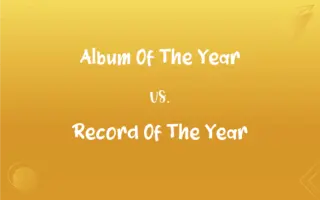Era vs. Fue: What's the Difference?
Edited by Aimie Carlson || By Harlon Moss || Published on February 24, 2024
"Era" refers to a period in time or history, while "fue" is the past tense of "ser" in Spanish, meaning "was" or "were".

Key Differences
"Era" is a noun used in English to describe a significant period in history marked by distinct features, events, or characteristics. In contrast, "fue" is a Spanish verb form, the third person singular past tense of "ser", meaning "was" or "were". Both words deal with the concept of time but in different contexts and languages.
In historical discussions, "era" is often used to signify a specific timeframe, such as the Victorian era or the digital era, emphasizing the unique aspects of that period. "Fue", on the other hand, is utilized in Spanish to describe a state or condition in the past, as in "Él fue presidente" (He was president).
The use of "era" can transcend literal time periods and refer to phases in personal lives or fields like technology and culture. Meanwhile, "fue" is strictly a grammatical term in Spanish, not used metaphorically or beyond its linguistic role as a past tense verb.
"Era" can be qualitative, describing the character of a period (e.g., an era of peace). In contrast, "fue" is factual, relating to the state or identity of a subject in the past in Spanish.
"Era" is a flexible, descriptive term in English for historical periods, while "fue" is a specific, grammatical term in Spanish, indicating a past state or identity.
ADVERTISEMENT
Comparison Chart
Language
English
Spanish
Part of Speech
Noun
Verb (Past tense of "ser")
Usage
Refers to a significant time period in history or a field
Indicates a past state or condition
Examples
Victorian era, digital era
Él fue presidente (He was president)
Flexibility in Use
Can be metaphorical or symbolic (e.g., an era of change)
Strictly factual and grammatical
ADVERTISEMENT
Era and Fue Definitions
Era
Era signifies a period with a dominant figure or phenomenon.
The Michael Jordan era in basketball was unparalleled.
Fue
In Spanish, fue is used for historical or biographical statements.
Fue el primer presidente de la democracia (He was the first president of the democracy).
Era
In geology, an era is a major division of geological time.
The Mesozoic era is known for the dominance of dinosaurs.
Fue
Fue is the past tense of "ser" in Spanish, meaning "was" for singular subjects.
Él fue un gran artista (He was a great artist).
Era
An era is a period marked by distinctive character or events.
The Renaissance era was a time of great cultural and artistic growth.
Fue
Fue can express a past condition or quality.
La comida fue deliciosa (The food was delicious).
Era
Era refers to a significant phase in the history of a culture or nation.
The industrial era dramatically changed how societies function.
Fue
Fue indicates a past state or identity in Spanish.
Fue una tarde hermosa (It was a beautiful afternoon).
Era
An era can be a stage in someone's life or career.
The early era of her career was marked by rapid advancement.
Fue
Fue is used in storytelling or recounting past events in Spanish.
Fue en ese momento cuando entendió todo (It was at that moment when he understood everything).
Era
A period of time as reckoned from a specific date serving as the basis of its chronological system.
FAQs
What is an era?
An era is a significant period in history or a field, marked by distinctive features.
What does 'fue' mean in Spanish?
'Fue' is the past tense of 'ser', meaning 'was' or 'were' for singular subjects.
Can 'fue' be used for historical statements?
Yes, 'fue' is often used in historical or biographical contexts in Spanish.
Are there different types of eras?
Yes, eras can be historical, cultural, personal, or geological.
Can 'era' refer to personal life stages?
Yes, 'era' can metaphorically refer to phases in personal lives.
Is 'fue' used in a specific context in Spanish?
'Fue' is used to describe past states or conditions.
Is 'era' a technical term in any field?
Yes, in geology, 'era' is a technical term for time divisions.
How is the word 'era' used?
'Era' is used to denote a historical period or a stage in a domain like technology or culture.
Is 'era' used in a scientific context?
Yes, in geology, 'era' refers to a major division of geological time.
How does 'era' differ from 'age' or 'period'?
'Era' is similar but often implies a more distinct or notable characteristic than 'age' or 'period'.
Does 'fue' have synonyms in Spanish?
Synonyms depend on context but include 'estuvo' for the verb 'estar'.
Are there eras in music or art?
Yes, there are distinct eras in music and art, like the Baroque or Romantic era.
Is 'fue' ever used metaphorically?
Generally, 'fue' is used in a factual, grammatical sense and not metaphorically.
Is 'fue' used in all Spanish-speaking regions?
Yes, 'fue' is a standard form in all Spanish dialects.
Can 'era' be plural?
Yes, 'eras' can refer to multiple distinct periods.
Is 'fue' used in formal or informal Spanish?
'Fue' is used in both formal and informal contexts.
Can 'era' refer to future periods?
Typically, 'era' refers to past or current periods, but it can be used speculatively for the future.
In what tense is 'fue' used?
'Fue' is used in the past indicative tense in Spanish.
Can 'fue' be used for both singular and plural subjects?
'Fue' is only for singular subjects; 'fueron' is used for plural subjects in Spanish.
Does 'fue' have different conjugations?
'Fue' is the past tense for singular subjects; other forms exist for different subjects and tenses in Spanish.
About Author
Written by
Harlon MossHarlon is a seasoned quality moderator and accomplished content writer for Difference Wiki. An alumnus of the prestigious University of California, he earned his degree in Computer Science. Leveraging his academic background, Harlon brings a meticulous and informed perspective to his work, ensuring content accuracy and excellence.
Edited by
Aimie CarlsonAimie Carlson, holding a master's degree in English literature, is a fervent English language enthusiast. She lends her writing talents to Difference Wiki, a prominent website that specializes in comparisons, offering readers insightful analyses that both captivate and inform.






































































